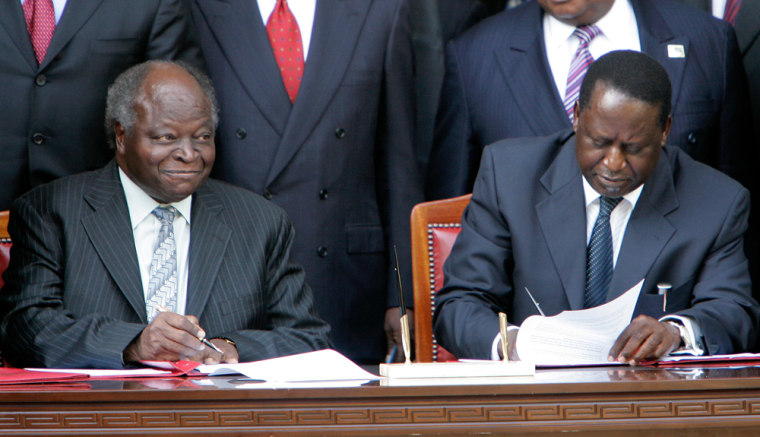Kenya's opposition leader said Friday he expects a new power-sharing agreement to succeed, two months after a disputed presidential election set off violence that tarnished the country's reputation for stability.
Raila Odinga will be prime minister under the deal he struck Thursday with President Mwai Kibaki. Odinga accused Kibaki of stealing the Dec. 27 election, and fighting over their dispute killed more than 1,000 people and forced 600,000 from their homes.
"If I did not believe in its ability to work I would not have entered it," Odinga told The Associated Press. "We believe strongly the country requires cooperation among all the parties so that we can cultivate understanding."
He said he did not expect Kibaki to "go back on his word."
The bitterness between Odinga and Kibaki men runs deep, however. Both men have been lashing out at each other since the election. They have traded accusations about inciting violence, stealing the vote and destroying the nation.
Former U.N. Secretary-General Kofi Annan, who mediated their agreement, had to prompt Kibaki and Odinga to shake hands Thursday as the cameras rolled.
Still, a deal was signed, and opposition supporters marched in celebration in the western town of Kitale on Friday.
‘Finally hope is back’
"Finally hope is back, Kenya has been reborn and it is like we are ushering in a new year!" shouted a marcher waving a picture of Odinga. About 500 people marched through town.
The number of international figures who aided the negotiations -- including Annan, Secretary of State Condoleezza Rice, the Tanzanian president and African Union head -- underscored the importance foreign powers put on Kenya's stability.
With war-fraught northern neighbors like Somalia, Ethiopia and Sudan, Kenya has long provided an economic and political anchor in a restive region.
"The Kenyan coalition government and people can count on our support as they move forward to implement the agreement and reform agenda," Rice said in a statement welcoming the power-sharing deal.
European Union the humanitarian chief Louis Michel said Kibaki and Odinga "have shown the wisdom and vision to choose the path of compromise and reconciliation."
Both the EU and the United States had said previously that they were reviewing their international aid to Kenya because of the crisis.
It was unclear when Odinga would take over as prime minister to govern alongside the president. Kibaki said he is reconvening parliament March 6 to begin work on the needed constitutional changes.
On Friday, the government expressed confidence that parliament will quickly pass the amendments.
"I expect us to fast-track it so that the country can get on its feet," government negotiator Mutula Kilonzo said.
Representatives for the two sides were meeting Friday to work out details.
Kenya's leaders also face the hard work of repairing the country.
Disarming militias
Much of the bloodshed pitted ethnic groups, such as Odinga's Luo tribe, against Kibaki's Kikuyu people, long resented for their domination of the economy and politics. Politicians have been accused of fomenting violence -- now the uneasy coalition will have to work together to disarm militia groups.
There is also the matter of restoring one of Africa's most promising economies. Kenya, one of the most prosperous and tourist-friendly countries in Africa, has seen up to $1 billion in losses linked to the turmoil.
